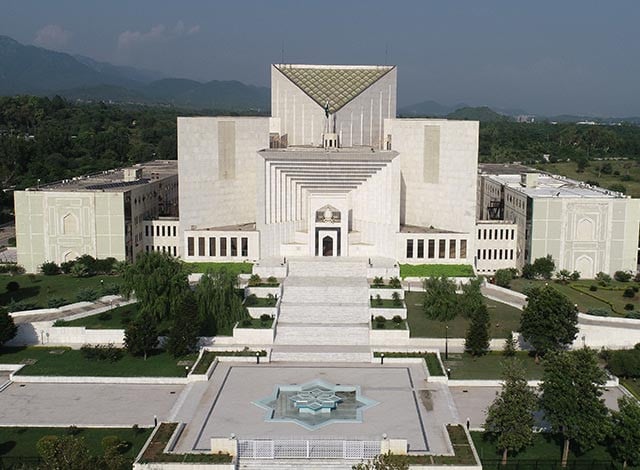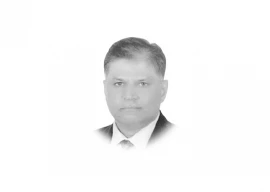
The Supreme Court has said that every citizen, including officers within its establishment, is bound to obey the constitution and the law.
The order was issued during a contempt matter against the additional registrar for allegedly failing to fix a case in violation of judicial directives.
In a written order issued by a division bench of the apex court comprising Justice Syed Mansoor Ali Shah and Justice Aqeel Ahmad Abbasi, the top court observed that under Article 190 of the Constitution, all executive and judicial authorities throughout Pakistan, including officers within the establishment of the SC, are required to act in aid of the apex court, meaning in aid of its judicial orders, not administrative orders.
Furthermore, in accordance with the constitutional mandate of Article 5 of the Constitution, every citizen, including officers within the establishment of the court, is bound to obey the Constitution and the law.
Accordingly, the legality of the explanation put forth by the registrar, as well as the outcome of the present contempt proceedings, hinges upon the determination of the questions.
In its January 21 proceedings, the bench raised two key questions. Firstly, it asked whether committees constituted under Section 2 of the Act and Article 191A of the Constitution can withdraw a case already taken up by a regular bench and involving significant constitutional questions.
The second question in consideration was whether such committees can undo, through an administrative order, a judicial order fixing a case's hearing before a regular bench.
The bench on Wednesday debated the role of two committees in determining which bench should hear a particular matter. At present, the original committee is not examining the jurisdiction of cases.
The Supreme Court, in a statement on Tuesday, clarified that the regular committee had directed that, in the future, all cases falling under Article 191-A of the Constitution must be placed before the constitutional bench committee constituted under Article 191-A, irrespective of any order passed by a regular bench.
On the other hand, counsel for respondents, Shahid Jamil, contended before the bench that all cases pending in the Supreme Court must first be taken up by the original committee under Section 2 of the 2023 Act.
If a question arises before that committee regarding whether a case should be heard by the constitutional bench or the regular bench, it should be referred to the committee constituted under Article 191-A of the Constitution as per Section 2A.
He submitted that "the question as to how the benches are to be regulated is a matter of some serious concern and therefore ought to be heard by a full court of this court," he added.
The counsel referred to Articles 204(c) and 175(2) of the Constitution to argue that the jurisdiction under Article 187 (complete justice) is also available to the bench. Hence, the decisions of the committee can be examined by the bench.
He further submitted that an administrative order cannot override a judicial order, and any inconsistency between the two renders the administrative order void and non est.
Meanwhile, Munir A Malik, appearing as amicus curiae, submitted that two fundamental questions arise in the case. First, cases pending in the Supreme Court must first be examined by the committee constituted under Section 2 of the 2023 Act, with matters sent to the Article 191A committee only when necessary.
Secondly, judicial orders cannot be trumped by administrative ones, as such actions undermine judicial independence.
He added that a case being heard by a bench cannot be withdrawn through an administrative order. He argued that these questions are of fundamental importance and go to the root of judicial independence, and therefore, they should be heard by a full court of this court to settle the matter once and for all.
When asked whether such an order can be passed in contempt proceedings, he responded that it could, as, in the present case, the accused's defence is that the case was not fixed before the Court because of the decisions of the two committees dated 17.01.2025.
Attorney General for Pakistan Mansoor Awan pointed out that the amicus curiae appointed by the court a day earlier are already counsel in cases challenging the 26th Constitutional Amendment before the constitutional bench.
However, the bench clarified that the question before them concerns the scope of Section 2 of the 2023 Act and does not directly relate to the 26th Constitutional Amendment.
The bench appointed Ahsan Bhoon and Khawaja Haris Ahmad as amici curiae in addition to those already appointed. The office was directed to inform them so they can make arrangements to appear in person or through video link before the Court today (Thursday), the order says.
Commenting on the ongoing proceedings, advocate Abdul Moiz Jaferii noted, "we have seen various abuses of process in our judicial palace of varieties over the past seven years. An order of a three-member bench being trumped by a research officer is the latest in these novelties".
Jaferii said pointed out that exists a regular committee to determine fixation and then another committee to fix so called constitutional bench cases.
"Surely, it is up to the statutory committee to decide whether an issue is to be sent to the constitutional bench or not. And where a judicial order is in the field, how can fixation of the case the order concerns be determined administratively," he wondered.
The lawyer recalled that when former chief justice of Pakistan Saqib Nisar pulled these "sleights of hand, we all knew what was actually afoot. When Qazi Faez Isa did it we were equally clear".
"Both those chief justices pretended not to know what was actually going on and feigned innocence. CJP Afridi must note, that the arc of the moral universe is long, but it bends toward justice," he added.


1737620781-0/lauren-(3)1737620781-0-165x106.webp)
1737617415-0/yankees-(1)1737617415-0-165x106.webp)

1737617320-0/fizza-(84)1737617320-0-165x106.webp)

1737616750-0/Tribune-N-(1)1737616750-0-270x192.webp)
1737616778-0/sidra--(27)1737616778-0-270x192.webp)


1732951088-0/Untitled-design-(11)1732951088-0-270x192.webp)
1736070587-0/Express-Tribune-(2)1736070587-0-270x192.webp)
1737452260-0/Gaddafi-stadium-(2)1737452260-0-270x192.webp)
1737531830-0/Saim-Ayub-injury-(2)1737531830-0-270x192.webp)









COMMENTS
Comments are moderated and generally will be posted if they are on-topic and not abusive.
For more information, please see our Comments FAQ